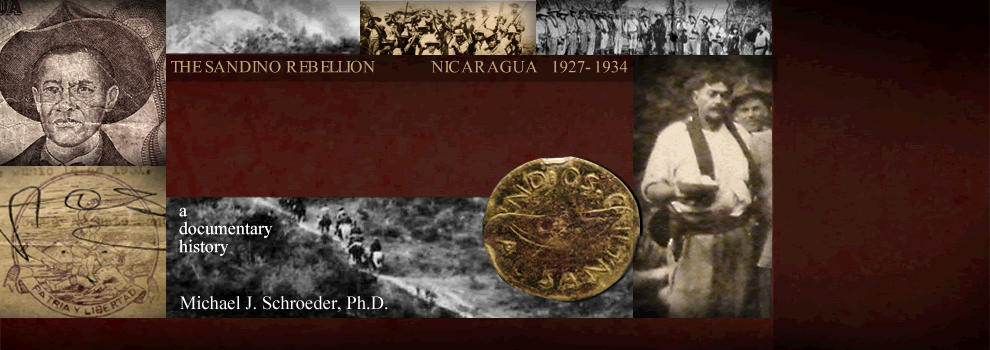
 |
|
M —
D O C S: M I S C E L L
A N E O U S D O C U M
E N T S |
|
thru 1927 |
1928 |
1929 |
1930 |
1931 |
1932 |
1933 + |
|
1
|
2
|
3
|
4
|
5
|
6
|
7
|
8
|
9
|
10
|
11
|
12
|
1
2
3
4
5
6
7
8 9
10 |
1
2
3
4
5
6 |
7
8
9
10
11
12 |
1 2 3 4 5 6 |
7 8 9 10 11 12 |
1 2 3 4 5 6 |
7 8 9 10 11 12 |
1 2 3 4 5 6 |
7 8 9 10 11 12 |
1 2 3 4 5 6 |
7 8 9 10 11 12 |
1 2
3 4 5 6
7 8 9 10 |
|
THIS IS THE SIXTH
PAGE
of the M-DOCS (Miscellaneous Documents) pages,
covering the month of
August 1927. The critical
introduction to the documents housed on this
page is forthcoming.
This website project is
indebted to Mr. Brandon Ray, Summa Cum Laude
college graduate from Ashford University in Iowa
(with a B.A. in History and a minor in Political
Science) for his meticulous transcriptions on
this and many other pages.
|
|
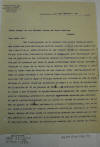
|
1.
August 1, 1927.
Letter from Leónidas Segundo Mena, Bluefields,
to US Consul A. J. McConnico, Bluefields, p. 1.
"Señor Consul de los Estados Unidos de Norte
America ¶ Ciudad ¶ Muy señor Mio: ¶ Con
instrucciones de mandante don Albert Fagot, de
quien soy apoderado generalisimo, me permite
exponer a Ud. lo siguiente, para que sea
trasmitido al señor Ministro de los Estados
Unidos en Managua, a fin de que este alto
funcionario cenezea la queja -- que ante él,
hace, por falta de justicia en los tribunales
comunes de Nicaragua, respeto a un juicio que le
promovio por suma de pesos cordobas, el señor
Carlos Hernando Ibara, en el lugar de su
domicilio, la comarca del Cabo de Gracias a
Dios. Ante el señor Juez de Distrito de ese
lugar, el señor Ibarra, demando por suma de
pesos cordobas a don Alberto Fagot,
representante que fue de la Sociedad 'The Albert
Fagot & Co.' cuya demanda fue iniciada el ano de
1925. Fallado el juicio llegó por apelación de
Fagot a la Corte de Apelaciones de Bluefields el
27 de febrero de 1926---Me presentó dentro del
termino legal a ese Tribunal de Apelaciones,
como apoderado de señor Fagot, mejoré el
recurso, y presente me escrito expresando
agravios, que contesté la parte contraria,
quedando asi el juicio en estado de sentencia.
En el mes de agosto de 1926, me pusieron en
prision e incomunicado, y asi, no me fue posible
atender en ninguna forma mis asuntos, en cuenta,
el de Minster Fagot. Estuve 59 dias preso en
Bluefields, durante los cuales, no me dieron
permiso ni para asistir a la gravedad de una mis
chiquitas, pero ni una sola vez. Estando en
prision, me sacaron por la fuera de Blue--- ..."
|
|
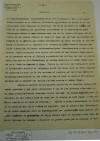
|
2.
August 1, 1927.
Letter from Leónidas Segundo Mena, Bluefields,
to US Consul A. J. McConnico, Bluefields, p. 2.
"..."
|
|
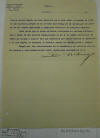
|
3.
August 1, 1927.
Letter from Leónidas Segundo Mena, Bluefields,
to US Consul A. J. McConnico, Bluefields, p. 3.
"..."
|
|
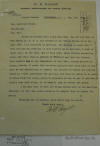
|
August 5, 1927. Letter from H. E.
Fagot, Puerto Cabezas, to US Consul A. J.
McConnico, Bluefields.
"H. E. FAGOT ¶ GENERAL MERCHANDISE AND MINING
SUPPLIES ¶ STORES: ¶ WASPOOKMOUTH, ¶ SANG SANG,
¶ SAN CARLOS, ¶ Puerto Cabezas ¶ NIC., C. A. ¶
Aug. 5th. 1927. ¶ Hon. American Consul, ¶
Bluefields: ¶ Hon. Sir: ¶ Please be advised that
I was born 22nt. [22nd.?] day of July 1881 in
New Iberia La. U. S. A. and resided in the
United States up to the year 1909. I am
therefore an American. And whereas it seems that
I have not had due proction [protection?] in
this Country as an American, I wish to state
that, on the 19th. day of July 1927. three
thieves entered my store and stole from me
upwards of $3600.00 and that the thieves have
confest [confessed?] to the Comandante of this
Port, having stollen [stolen] my money, however
it seems that no sever [severe?] measures have
been used on the part of the authorities to
compell [compel] the thieves to return the
stollen [stolen] money as I have prosecuted the
parties, and they are going to be sent to
Bluefields for trial, would be greately
[greatly?] oblige to you if you would kindly
take such steps, as to compell [compel] them to
return the money. ¶ I am sure that if they are
being turned over to the American Comander
[Commander], he will use sever [severe?]
measures to compell [compel] them to return the
money. ¶ Thanking you in advance, mean while beg
to remain, ¶ Yours very truly, ¶ H. E. Fagot"
|
|
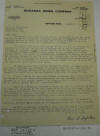
|
August 9,
1927. Letter from George A. Napoleon,
Bonanza Mines Co., to US Consul A. J. McConnico,
Bluefields.
"DIRECT ALL CORRESPONDENCE VIA BLUEFIELDS,
NICARAGUA. ¶ CABLE ADDRESS: ¶ WARNICK ¶
PHILADELPHIA ¶ BLUEFIELDS ¶ BONANZA MINES
COMPANY ¶ EXECUTIVE OFFICE ¶ 1218 LOCUST STREET
¶ PHILADELPHIA, PA. ¶ U. S. A. ¶ NEPTUNE MINE,
August 8, 1927 ¶ Mr M. J. McConnico, ¶ American
Consul, ¶ Bluefields, Nic. ¶ Dear Sir: ¶ Mr
Warnick left here July 9th for the States. His
reason for going he told me was to procure the
necessary supplies and foodstuff which Mr
Springer refused to send. Mr Springer has a
contract (see mining code-Aviador) to furnish
mine with foodstuff and supplies. ¶ Mr Warnick
left me in full charge of the mine and its
affairs. He instructed me to send bullion to Mr
Springer and to pay Mr Springer’s account. Mr
Springer has now sent Mr Skaling to take over
this property and affairs without sending me a
court order, or the courtesy of a letter,
neither has he sent money to liquidate the
labourers. Mr Skaling has brought two thousand
dollars to pay for work that laborers will do
for him after he has received the property from
me. When Mr Warnick left here he instructed me
to get what foodstuff and supplies I could
around here and if money did not come in I was
to settle with gold. ¶ Mr Skaling came here with
Mr Springer’s brother in law who is to act as
Police Inspector and forcibly if necessary take
over the mine and turn it over to Skaling.
Skaling states that Mr Springer has been
appointed receiver by Court but he has no
documents with which to prove it here. ¶ I will
deliver the mine and affairs of Bonanza Mines
Company to him if forced to by the Police
Inspector, under written protest, or upon him
presenting me with proper papers. I am bringing
this to your attention so as to protect myself
from all responsibilities. ¶ There is a Chinese
merchant in Tunky who came in yesterday to find
out what was going on. He had been notified to
do so by Juan Pong of Sun Hing Long, Bluefields,
they are one of the largest creditors of the
Company, and although Mr Springer had stated to
others that he had been appointed “Interventor”
by creditors (Juan Pong) knew nothing about it.
¶ I cannot understand if Mr Springer is acting
under his Aviador’s contract, as Power of
Attorney of the Company, or for some other
interest. ¶ As this is American property I would
like for you to look into the matter so as to
avoid as much litigation as possible, and I do
not want to be the [hole in paper]. Trusting you
will give the matter your consideration I am, ¶
Yours very truly, ¶ George A. Napoleon"
|
|
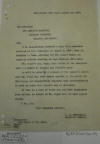
|
August 10, 1927.
US Consul A. J. McConnico, Bluefields, to US
Minister, Managua.
"Bluefields, Nicaragua, August 10, 1927. ¶ THE
HONORABLE ¶ THE AMERICAN MINISTER, ¶ AMERICAN
LEGATION, ¶ MANAGUA, NICARAGUA. ¶ Sir: ¶ I am
transmitting herewith a copy of a complaint
received at this consulate on August 1, 1927,
from Dr. Leonidas S. Mena, attorney for Mr.
Albert Fagot, an American citizen residing at
Cape Gracias, Nicaragua. ¶ Mr. Fagot’s son,
Hugh, also called at the consulate with the
lawyer to explain his father’s case. ¶ As will
be noted by a perusal of the lawyer’s statement
Mr. Fagot has been denied justice in the courts
of Nicaragua, and respectfully requests that
representation be made in order that justice may
be obtained. ¶ If this is a case of which you
can take cognizance your efforts in behalf of
Mr. Fagot will be much appreciated. ¶ I am, Sir,
¶ Your obedient servant, ¶ A. J. McConnico, ¶
American Consul. ¶ Enclosure: ¶ Complaint of Dr.
Mena. ¶ McC/S ¶ 320."
|
|
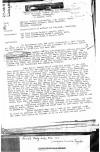
|
1.
August 13, 1927.
"Investigation of affairs at Juigalpa,
Nicaragua." Captain Richard Livingston, USMC,
Granada, to CO 5th Regt., Managua, p. 1.
"Headquarters, 17th Company, 1st Battalion, ¶
Fifth Regiment, Second Brigade, U.S.M.C. ¶
Granada, Nicaragua, ¶ 13 August, 1927. ¶ From:
Captain Richard Livingston, U.S. Marine Corps. ¶
To: The Commanding Officer, Fifth Regiment, ¶
Managua, Nicaragua. ¶ Subject: Investigation of
affairs at Juigalpa, Nicaragua. ¶ References:
(a) Your letter dated 2 August, 1927. ¶ (b) Your
endorsement dated 2 August, 1927. ¶ (c) Your
letter dated 4 August, 1927. ¶ Enclosures: ¶ 1.
In accordance with the above references I left
Granada at three (3) P.M. Friday August 5th and
proceeded to Juigalpa, arriving in Juigalpa at
10:30 P.M. the same day. ¶ 2. Saturday August
6th the Investigating Officer notified
Lieutenant Carrol that he was in Juigalpa to
investigate into the affairs and reports
concerning him. At three thirty the same day the
investigation started and all telegrams and
letters were read to Lieut Carrol and Clementino
Miranda was called. The telegram of Clementino
Miranda was read, she stated it was the telegram
she had sent to the Minister of the Government
and stated as follows: ¶ That Lieut. Carrol
would close her place, if the girl that lived
with her did not allow him to stay with her.
Liut. [Lieut.] Carrol came to my house one night
with the District Judge, Jose Fenderez, Ramono
Mongrio and some other men. Judge Fenderez
knocked on my door and told me to open it. I
opened the door and they all came in, then
Lieut. Carrol told me that there was a
prostitute in my house and immediately went to
the bed room and told her (Anita) to get out and
took her to the kitchen. When he took her to the
kitchen, he had his hands on her mouth as she
was crying and then I told the Judge to tell Mr.
Carrol not to do anything to the girl. After
Jose Fenderez told him to let the girl alone,
Lieut. Carrol came into the front room and took
a hold of me and told me if Anita didnt [didn’t]
allow him to stay with her she would have to
leave the city and that is when I had to send
her to my sisters [sister’s] house. (Her sister
runs a canteen in another part of the city
town). Ramono Mongrio called Lieut. Carrol and
they all went out. This party also stated the
telegram was written and sent by Adrion Gomez
chief of the police eight days after Lieut.
Carrolhad [Carrol had] been to her house, also
that she couldnt [couldn’t] write very well. ¶
The District Judge Jose Fenderez was called. The
telegram sent by Clementino Miranda to the
Minister of the Government reporting Lieut.
Carrol was read and asked what he knew about the
affair. He stated as follows: ¶ About eighteen
days ago I came to the Imperial Hotel to visit
an employee of the Jabali Mines. A few moments
after I arrived there this gentelman [gentleman]
invited me to go out with him and Lieut. […]"
|
|
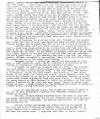
|
2.
August 13, 1927.
"Investigation of affairs at Juigalpa,
Nicaragua." Captain Richard Livingston, USMC,
Granada, to CO 5th Regt., Managua, p. 1.
"[…]
Carrol, Ramono Mongrio and Carlos Cardinal,
because they wanted to see some woman. I told
them I did not know any bad women in this town
where I could take them but Lieut. Carrol told
me of a place where we could find some one and
then he took us to the house of Clementino
Miranda. When we got to this house Lieut. Carrol
asked for a girl named “Anita” and he was told
that she was in bed. Then Lieut. Carrol forced
this girl to get up, he begged her to allow him
satisfaction, because he knew she was a public
woman in “Acoyapa” as the girl protested and
told Lieut. Carrol she had a man, Carrol carried
her out ot [to?] the kitchen, then I stepped in
and told Lieut. Carrol to let her go, explaining
to him that we did not use that custom here, at
the same time I took the girl from him and took
her to her bedroom. We started to leave the
place, at that moment Lieut. Carrol told
Clementino, “if she didnt [didn’t] make Anita
satisfy his desire he would close her place.[”]
Lieut. Carrol knocked at the door to awake those
inside. There were present Santiago Randes an
employee of the Chontales Gold Mines and Max
Borgzimer who I do not know very well. I had
been at the Hotel a half hour when Lieut. Carrol
arrived. We had all been drinking. ¶ Anito
Espinoza the girl who lived with Clementino was
called and stated that the telegram was false
and when and when questioned further another
native woman told her to say yes to all my
questions. ¶ Wilfred James Kerr M.D. from
Acoyapa was called and stated that he knew this
woman Anita to be a prostitute and that some men
came to me for treatment for chancroids
[cancroids] and stated that she had given the
chancroids [cancroids] to them. On the street in
Acoyapa sometime during June with Lieut. Carrol
we met her and I told him that she was infected
and was a prostitute. I can identify her when I
see her. The Investigating Officer proceeded to
the canteen where Anita was living where he
identified her as the woman from Acoyapa. ¶
Sergeant Joseph G. Harris was called and was
asked to state what he knew regarding Lieut.
Carrol creating a disturbance at the Canteen of
Clementino Miranda and he stated as follows: ¶ I
recall one night on or about July 21, 1927, I
was visiting the town patrol a little after
midnight and I noticed a group of fellows who
were talking rather loud. I saw them enter the
Canteen of Clementino Miranda and from where I
was standing, I saw Lieut. Carrol in the party
and during the entire time he stated in the
Canteen he was visable [visible] to me, he at no
time conducted himself in an ungentelmanly
[ungentlemanly] manner during the time they were
there. I should judge the party stayed at this
Canteen for about ten minutes. As they were
leaving I shoved off as I did not wish Lieut.
Carrol to think I was spying on him. I then
returned to the barracks and before I turned in
I heard Lieut. Carrol come into his room. ¶ O.E.
Williams HA-1cl U.S.N. was called and asked to
state if any men of this Detachment reported
with venereal disease and he stated as follows:
¶ Yes Sir, Private Debnam reported about the
20th of July having acute Gonorrhoea [Gonorrhea]
and was put on the venereal restricted list and
was given routine treatment. He made no
statement as to where he had contracted it. ¶
Private Debnam was called and stated that he did
report to the Sick Bay with Gonorrhoea
[Gonorrhea] and stated that he had contracted it
while staying with a woman at a Canteen called
“Clementino”. I do not know the womans [woman’s]
name. I reported this fact to Lieut. Carrol.
[...]"
|
|
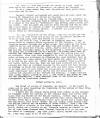
|
3.
August 13, 1927.
"Investigation of affairs at Juigalpa,
Nicaragua." Captain Richard Livingston, USMC,
Granada, to CO 5th Regt., Managua, p. 1.
"[...] Mr. Lewis F. Baez was called and asked
to state what he knew about the Canteen of
Clementino, he stated as follows: ¶ It is a
place where they sell liquors and keep
prositutes [prostitutes], sometimes one or two.
¶ Captain Richard Livingston and asked what he
knew about the Canteen of Clementino and stated
as follows: ¶ During the period I was in Command
here, it was reported to me by the Hospital
Corpsman that a Canteen down the street and ran
by a woman of the name of “Clementino” had
several prostitutes living there. They followed
the Marines from Granada and two of them had
failed while in Granada to pass the prescribed
examination before the board of Health Doctor. I
ordered the place out of bounds after an
investigation. ¶ Mr. M.A. Borgzimmer of the
Jabali Mines was called and was asked what he
knew about the affair at the Clementino Canteen
on or about July 21st, 1927 and stated as
follows: ¶ On the 21st of July I arrived in
Juigalpa from the mine accompanied by several
other employees of the Company. I met in
Juigalpa several friends and after supper that
night at the Hotel Imperial we all sat around
the table and had several rounds of drinks. At
about ten o’clock, Lieut. Carrol came by and
since I had met the Gentleman early in the
afternoon I invited him to join the party and
introduced him all round. We finely [finally?]
went down to another bar (Abaunza) where we
stayed until the lights went out at midnight.
Some body then suggested to look up some women
and since we were all strangers in Juigalpa Dr.
Jose Fenderez took us to a place, the woman
opened the door after the Judge told her to do
so and we all went in. After awhile a younger
Woman appeared and Lieut. Carrol told me, that
she had just infected one of his Marines and
that he intended closing up the place for this
reason. We started in about ten minutes and left
and went home, altho [although] all of us were
more or less under the influences of alchol
[alcohol]. I recollect especially that Lieut.
Carrol was not drunk and behaved quietly and
gentlemanly all through the evening. I might
mention that Lieut. Carrol joined us late in the
evening and after we left the bar (Clementino) I
went straight home to the Hotel and was
accompanied by Lieutenant Carrol. ¶ SUNDAY
AUGUST 7, 1927. ¶ The Chief of Police of
Juigalpa was called. He was asked to state all
he knew regarding the disarming of the Police of
this City. He stated as follows: ¶ I never had
the Police Force armed with rifles in the
streets of Juigalpa since the arrival of the
Marines here, the rifles were taken from the
Police at the Police Station. Before that I was
in perfect with Lieut. Carrol. I was present
when Lieut. Carrol and General Pocha had a
conversation about some horses and I think that
was the motive that Lieut. Carrol had for taking
those rifles from the Police Station was on
account of those horses. When I was disarmed I
took a prisoner to the Judge because I couldnt
[couldn’t] keep him. Lieut. Carrol was friendly
to all liberals because he stated at the Bar of
Jose Tomas Abannza [Abaunza?] that “General
Moncada will be the next President of
Nicaragua.[”] Any time Lieut. Carrol wanted
anything of me, I was very glad to do it for
him. [...]"
|
|
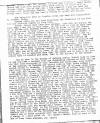
|
4.
August 13, 1927.
"Investigation of affairs at Juigalpa,
Nicaragua." Captain Richard Livingston, USMC,
Granada, to CO 5th Regt., Managua, p. 1.
"Another reason I had for sending telegram was
because I heard Lieut. Carrol had told some
people here, also myself, he would lock up
General Rocha. Before that day I was disarmed I
did not have any trouble Lieutenant Carrol.
Lieut. Carrol has visited my house almost every
night and has been a friend to myself and
family. ¶ The telegrams sent by General Rocha
was read and indentified [identified] by General
Rocha. ¶ Please state all you know regarding the
disarming of the Police and Hacienda Guards at
this town. ¶ Lieut. Carrol came here from
Acoyapa with his men during the time that I was
not in this town. On the 29th of July he came
here to my office with Leoarna Arrallno and he
asked me for two horses that he claimed to have
given me, those horses were never given to me
because as I stated before I was not here when
Lieut. Carrol came to this town. Moreover and to
please Lieut. Carrol I did my best to find out
where those horses were and I found this: One of
the horses that belonged to Alberto Arguellos
[Arguello’s] brother-in-law of Lewis Montell who
is in charge to get all the horses of Arguello
was at the ranch of Lewis Montell at Puerto Diaz
and then I told Montell to bring the horse and I
returned it to Lieut. Carrol. The other horse
was taken away by its owner who took it to San
Pedro, this I found out ot [to?] be true,
because Senator Lazo sent me a notice by
telegram, that the horse was in power of its
owner. I told Lazo to send the horse, but he
answered back that the horse was in such a bad
condition that it couldnt [couldn’t] get here,
that is the history of the horses. ¶ Now we come
to the horses of Carcoma Lieut. Carrol told me
that he had received a message from the
Commanding Officer at Boca telling him that some
employees of this Jefatura had taken away some
horses of the property of Carcoma and Carrol
told me that those horses I should return to
Carcoma. I answered him that if Carcoma could
prove that those horses were his I didnt
[didn’t] any reason to return them because I had
sent for horses that belonged to the Government
and not of any particular man. Lieut. Carrol got
angry and told me that I took the property of
the liberals to give it away to the
conservatives. To this I deemed an insult I
answered that he does not know me and that as a
particular I have a right to be a conservative
but as a Judge I am neither a Liberal nor
Conservative with this explanation Lieut. Carrol
was not satisfied because he left my office very
much disgusted and as a proof to that fact he
took the rifles away from the Police Forces and
this happened exactly as the Chief of Police
stated in his declaration. As he might say that
he took those rifles because policemen paraded
in the streets during a funeral of a Military
man. I did this because I received telegraphic
orders from the President to give that man the
Corresponding Honors to his grave (Copy of
telegram attached). This parade was held on the
24th of last July and Lieut. Carrol took the
rifles five days afterwards, without ever
telling me during those five days, not even a
word in relations to this and I did order to the
Chief of Police to send that arm guard, because
in accordance with the telegraphic orders of the
President I had to send the National Flag to the
funeral and Military Laws prohibit to send the
National Flag without an armed guard. Now I am
going to explain why I told to the President and
General Cardenes that Lieut. Carrol was in frank
sympathy with the Liberals. I dont [don’t] like
to make a charge if I cant [can’t] prove it. Mr.
Manwell LaCayo told me that in the Bar of Jose
Tomas Abannza [Abaunza?], Lt. Carrol […]"
|
|
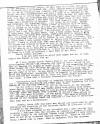
|
5.
August 13, 1927.
"Investigation of affairs at Juigalpa,
Nicaragua." Captain Richard Livingston, USMC,
Granada, to CO 5th Regt., Managua, p. 1.
"[…]
in the presence of some people, he said that the
future President of Nicaragua will be General
Jose Maria Moncada because almost all the people
in Nicaragua are Liberal, that only in Granada
and Contarles [Chontales] you find Conservatives and what I
said in my message in the relations to my belief
that the Liberals would repeat the same acts
they have done in Chinandega and other places,
when they see us disarmed. It was because I had
news that in some place in this town there was a
gathering of Liberals who were shooting fire
crackers and threating [threatening?] the
conservatives. I am going to say this: Lieut.
Carrol told in the house of Gomez (Chief of
Police) that he would put me locked up in a cell
if I did not return the horses. I want to state
that I sent those telegrams not because I am
against Lieut. Carrol but I did this because I
am oblidged [obliged] to tell my Government of
everything that happens here. That I have always
tried to maintain friendly relations with Lieut.
Carrol and work in harmony with him. As a proof
of what I just said I will show you a letter
that I just received from him and my answer to
him. (Copy attached). This to prove that I have
always wished to tetain [retain?] good relations
with the Lieut. I want to state also that even
after these troubles about the horses and
threats he made to lock me up I went to see him
and invited him to come to my house and
presented him to my wife. I did all of this to
so in this way to maintain the good relations
that there should be between him and I. I want
you to ask Lieut. Carrol if there is a word in
anything I said that is not true. ¶ Lieut.
Carrol replied: ¶ I do not know what he might
have heard but all is true except the threat to
lock him up. ¶ At 7 P.M. Sunday Lieut. Carrol
came to the Hotel where the Investigating
Officer was stopping and said he had a Native by
the name of Carcoma who wished to speak to me.
It was regarding the National horses the Jefe
Politico was getting together. I warned Lieut.
Carrol not to interfer [interfere] with Civil
affairs, but he insisted that it was his duty to
do so. He was asked if he understood Force Order
No. 18 and Regimental Memorandum No. 76 in
regards to interfering with Civil affairs and
ordered him to carry out those orders without
further talk. I then sent a telegram
recommending his relief. ¶ Constantino Rios
Collector of internal Revenue for the Department
of Chontales was called and asked what he knew
regarding the disarming of the Hacienda Guards
on July 29th, 1927. ¶ On the 29th of July I sent
out the Commander of the Hacienda Guard Carlos
Barrera with two Guards armed with rifles with
orders to weight [weigh?] the aguardenta that is
sold at the different places at this town and
those two guards were disarmed by the Marines. I
do not know why they were disarmed. Of the whole
matter I gave notice to the Minister of finance
who is my superior. Two days afterward a soldier
of the Hacienda Guard was disposed of his belt
of cartridges that they use as a distruction
[distraction?]. ¶ General Rocha Jefe Politician
was called and asked what he knew regarding the
disarming of the Hacienda Guards as mentioned in
his telegram to the President. ¶ I sent that
telegram to the President and I show you now
this telegram I received from the Minister of
Finance in regards to arms I should supply to
the Hacienda Guards (copy attached) I have
nothing more to say as my telegrams explain
everything. There is one more thing I would like
to state that is regarding this man Carcoma.
[...]"
|
|
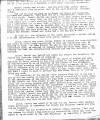
|
6.
August 13, 1927.
"Investigation of affairs at Juigalpa,
Nicaragua." Captain Richard Livingston, USMC,
Granada, to CO 5th Regt., Managua, p. 1.
"[...] During the late Civil War he served with
me as a Conservative soldier as I can prove by a
telegram I have here. (Telegram attached). ¶
Endoro Suarez was called. Did you ever hear
Lieut. Carrol make a statement that he would
lock up the Jefe Politico. (General Rocha). ¶
Yes Sir he told me that in my house one night
and Augustive Aguilara was present. This came
out of a Conservative [conversation?] I held
with him that night. Lieut. Carrol was angry
about some horses that the Jefe Politico had
taken from him and Lieut. Carrol added that
General Rocha would not be Jefe Politico any
more. He was speaking in Spanish but I
understood him so well that I replied to him
that General Rocha was a nice person and that he
couldnt [couldn’t] lock him up because he was
the Jefe Politico. Lieut. Carrol then answered,
“he did not care if General Rocha was the Jefe
Politico or not,[”?] because the President of
Nicaragua was General Feland and Rocha was a bad
man and a liar. ¶ At 4:30 P.M. the Corporal of
the Guard presented a letter marked ? to the
Investigating Officer from Lieut. Carrol. ¶
Lieut. Carrol was given verbal orders to attend
the investigation and would be given every
oportunity [opportunity] to make any statements
ect. [etc.] he desired to make. He then stated
“he was no fool[”?] and would make no statements
until he arrived in Managua where he would make
them. The reasons for that the Investigating
Officer had had him relieved of his Command. ¶
Lieut. Carrol was called and asked his reason
for disarming the Police and Hacienda Guards at
Juigalpa. ¶ Several times I had suggested to the
Chief of Police and Jefe Politico to issue
permits in due form signed by the Jefe Politico
as as countersigned by me as required by the
Decree of the President, this because numerous
armed men were continuely [continually]
appearing on the streets of Juigalpa with out
any possible means of identification. I had
instructed Gomez that his Police while on duty
would carry clubs only, and that I would be glad
to provide any arm force that he or General
Rocha may need. ¶ The personnal [personnel] of
the Police Force changes from day to day and I
and my men are unable to identify the Police
authorized to carry arms. As the consequence of
the above on July 29th I collected eight rifles
in the streets and five others in the Police
Station and held them until the following
morning when seven permits duly signed by the
Jefe Politico were delivered to me for
signature. I signed them and issued the rifles
and four other have been issued, reports of all
being rendered as required by Force Order No.
20. I still have two others and have notified
General Rocha that they will be issued to whom
he may direct. Lieut. Carrol was asked further
if he notified his Commanding Officer of his
action, he stated no, and he was not familiar
with the duties of the Police of this town, but
told Mr. Gomez, my Marines were available any
time he may call them. ¶ Lieut. Carrol was asked
if he had had any trouble with General Rocha
previously to disarming the Police and Hacienda
Guards and stated as follows: ¶ I never had any
trouble with General Rocha, however I had lost
two horses for which I was personally
responcible [responsible], which had been
disposed of by an order of the Jefe Politico. By
inauiring [inquiring] I learned […]"
|
|
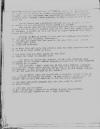
|
7.
August 13, 1927.
"Investigation of affairs at Juigalpa,
Nicaragua." Captain Richard Livingston, USMC,
Granada, to CO 5th Regt., Managua, p. 1.
"[...] where the horses were and went to
General Rocha with Leo Arellano and asked him to
return my horses immediately, one was returned
the following day and the other was permitted by
agreement to return to its owner. General Rocha
agreeing to loan me another one to replace it. ¶
Lieut. Carrol was questioned further and was
asked – by what authority did you commandeer
those horses and stated: ¶ The horses were not
commandeered, but were for my personal use
through the courtesy of Anselmo Lazo of San
Pedro and Ernest Arquello of Granada. A report
of this was made to Major Bartlett then
Commanding at Granada. ¶ Israbel Chavarrie
Keeper of the jail at Juigalpa was called and
was asked the following questions: ¶ Q. How many
prisoners did you have in the jail from July
25th to August 1st, 1927? ¶ A. I had one
prisoner. ¶ Q. On July 29th and up to the
present date has that prisoner escaped? ¶ A. No,
he is still there in jail. ¶ Q. How long have
you been keeper of the jail? ¶ A. Since the
first of January 1927. ¶ The Chief of Police was
called. It has been reported that prisoners at
the Police Station escaped on July 29th is that
correct? He stated as follows: ¶ One prisoner I
had I took him to the Judge because I couldnt
[couldn’t] keep him any longer after Lieut.
Carrol had taken the rifles from the Police. I
gave this prisoner to the Judge in the Plaza,
because it was the only one he kept by his
orders. ¶ The District Judge was called and a
telegram signed by him to the Minister of
Justice was read. He was asked if he sent it. He
stated that he did, and answered to the
following questions. ¶ Q. How many prisoners
escaped from the jail July 29, 1927? ¶ A. About
three. ¶ Q. What was [were] the offenses? ¶ A.
If I could see a paper in my office I could tell
exactly. ¶ Please bring that report ot [to] me.
(Copy attached). [...]"
|
|
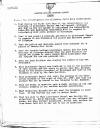
|
8.
August 13, 1927.
"Investigation of affairs at Juigalpa,
Nicaragua." Captain Richard Livingston, USMC,
Granada, to CO 5th Regt., Managua, p. 1.
"[...] IN REPLYING REFER TO NO. ¶ UNITED STATES
MARINE CORPS ¶ FACTS ¶ During the investigation
the following facts were established: ¶ 1. That
during the first five days of the investigation
the attitude of Lieutenant Carrol was
belligerent, stubborn and that he did not appear
to understand the orders (Force Order #18 and
Regimental Memorandum #76) in regards to
interfering with civil affairs in Nicaragua. ¶
2. That is was purely a personal grievance by
Lieutenant Carrol in regards to him disarming
the police and Hacienda guards at Juigalpa. ¶ 3.
That the police and Hacienda guards were
disarmed for a period of twenty-four hours. ¶ 4.
That the trouble between Lieutenant Carrol and
the Jefe Politico at Juigalpa started when the
Jefe Politico returned two horses to their
owners which Lieutenant Carrol claimed for his
own personal use. ¶ 5. That the Jefe Politico
was obeying the orders of his own President. ¶
6. That Lieutenant Carrol was inclined to mix in
the politics of this country and did state in
public that Gen. Moncada would be the future
President of Nicaragua and that he did threaten
to lock up the Jefe Politico. ¶ 7. That
Lieutenant Carrol did visit the cantina of one
Clemintino Miranda on the night of July 21,
1927, and that his conduct was not as stated in
her telegram to Mr. Cardnes. ¶ 8. That the woman
in question runs a small cantina of bad
reputation, keeping in her cantina several
prostitutes. ¶ 9. That Clemintino Miranda did
not send the telegram in question. It was
written and sent by Andran Gomez. ¶ 10. That the
girl to whom Lieutenant Carrol was forcing his
attentions to, Anito Espinoza, stated that the
telegram was false, and when further questioned,
stated that another native woman told her to say
yes to all my questions. [...]"
|
|
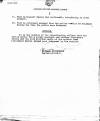
|
9.
August 13, 1927.
"Investigation of affairs at Juigalpa,
Nicaragua." Captain Richard Livingston, USMC,
Granada, to CO 5th Regt., Managua, p. 1.
"[...] IN REPLYING REFER TO NO. ¶ UNITED STATES
MARINE CORPS ¶ 11. That Lieutenant Carrol was
continually interfering in civil affairs. ¶ 12.
That no prisoners escaped from the police
station at Juigalpa during the time the police
were disarmed. ¶ OPINION. ¶ It is the opinion of
the investigating officer that the entire matter
was a purely personal one between Lieutenant
Carrol and the Jefe Politico andis [and is] of
the opinion that Lieutenant Carrol showed poor
judgement by his actions. ¶ RICHARD LIVINGSTON ¶
Captain, U.S.M.C."
|
|
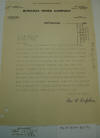
|
August 14, 1927. Letter from
George A. Napoleon, Neptune Mines, to US Consul
A. J. McConnico, Bluefields.
"DIRECT ALL CORRESPONDENCE VIA BLUEFIELDS,
NICARAGUA. ¶ CABLE ADDRESS: ¶ WARNICK ¶
PHILADELPHIA ¶ BLUEFIELDS ¶ BONANZA MINES
COMPANY ¶ EXECUTIVE OFFICE ¶ 1218 LOCUST STREET
¶ PHILADELPHIA, PA. ¶ U. S. A. ¶ MINES: ¶
DISTRICT OF PIS-PIS ¶ NEPTUNE MINE, August 14,
1927 ¶ Mr. M. J. McConnico, ¶ American Consul, ¶
Bluefields, Nic. ¶ Dear Sir: ¶ Kindly have
enclosed letter mailed to Mr Warnick, I have not
yet made the turn over of the mine to Mr Skaling
who Springer sent, I would appreciate your
advise [advice] regarding the matter. Springer’s
account has been materially reduced with
shipments of bullion, No. 137, 138, 139, His
account to June 30 was $16.000. bricks No. 137,
138, 139 should produce $15,000. He no doubt
will charge all that he is now sending to
Skaling on the account which will increase it
again, but as he refused to send us supplies he
has no right under his Aviador’s contract. These
are only pointers I am giving you as I consider
your advise [advice] in the matter will be
valuable to me. Thanking you in advance I am, ¶
Yours very truly, ¶ George A. Napoleon"
|
|
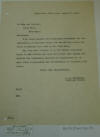
|
August 15, 1927. Letter from US
Consul A. J. McConnico, Bluefields, to Wo Hing &
Company, Cukra Hill.
"Bluefields,
Nicaragua, August 15, 1927. ¶ Wo Hing and
Company, ¶ Cukra Hill, ¶ Nicaragua. ¶ Gentlemen:
¶ Your claim against the Nicaraguan Government
for the destruction of property during the
recent revolution was taken to Managua last week
by Mr. Juan Pong. ¶ Mr. Pong will present it to
the Claims Commission which is not sitting and
upon his return will inform you whether the
Commission approved or disapproved it, or what
other requirements may be necessary to complete
your claim. ¶ Yours very respectfully, ¶ A. J.
McConnico, ¶ American Consul. ¶ McC/S ¶ 350."
|
|
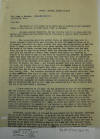
|
August 17, 1927. Letter from Henry
Spears, Puerto Cabezas, to Gen. Juan J. Estrada,
Bluefields, p. 1.
"Puerto Cabezas, August 17, 1927 ¶ Gen. Juan J.
Estrada, Jefe de Politico. ¶ Bluefields, Nic., ¶
Dear Sir: ¶ The motive of this letter is to
advise you of conditions that actually exist in
Cape Gracias, at which place I have a business:
¶ Governor Antonio Salaverri, who was recently
sent to the Cape, has committed many crimes
against myself and my interests, a part of which
consists of the following: ¶ The second day
after his arrival there, at which time Iwas [I
was] here in Puerto Cabezas looking after some
business, he sent two armed policemen up to my
sawmill, just above the Cape, knowing that there
was no one except my daughter about 17 years of
age, and who cannot speak Spanish, and a little
native girl who works at the house, present when
they arrived, Mrs. Spears with the baby being
down at the Cape on an errand. These two
policemen went on a raft of my pine logs and
started to measure them, without even having the
courtesy to inquire at the house if any one was
there to represent the premises. My daughter
asked them their business and was informed that
they were there to measure my logs,- she asked
them to not interfere with the logs, but to wait
until I returned from Puerto Cabezas, their
answer was that they had instructions from the
Governor to measure the logs, - she insisted to
them [these two words, “to them,” appear to be
crossed out] that they should not touch the
logs, and finally when one of them stuck out his
tongue at my daughter she presented a rifle and
demanded they leave, one of them reached for his
pistol at which time she drew the rifle and
demanded that he do not touch his pistol,- they
finally left. The Governor afterwards came up
with several other men, none of whom were armed
that could be seen, except the Governor had a
pistol under his shirt, and after trying to
measure the logs, they were finally convinced
that it would not be allowed and they too
returned to the Cape. Mrs/ [Mrs.] Spears at once
wired the Commander at Puerto Cabezas for
protection against these abuses, and the
Destroyer 314 went to the Cape and instructed
the Governor not to send any one to my mill
until I returned. ¶ I later returned to the Cape
and was requested to come to the Gobernacion and
was informed that an indian had made a complaint
against me, which was, of course, a conspiracy
among the enemies of mine. I showed that the
indian had owed me $11.70 since January 1925,
which had been advanced him to cut logs for me.
His brother delivered the logs to me, had me
measure them and one of his indian women, at his
request, placed my hammer brand on the logs, but
after consulting with certain enemies at the
Cape, he would not receive the money for his
logs, nor acknowledge the account of his
brother’s, the owner of the logs. The Governor
accepted his denial against my word and ordered
the logs removed from my mill, which was done
under protest. ¶ On Monday, August 6th, he
refused to sign papers for the Schooner WINFIELD
for no reason whatever, resulting in my holding
the schooner over there for another day on
account of my knowledge of his refusal only came
to me when the schooner was being towed out and
I had to have it returned with a tow boat to my
wharf at my store and residence down at the Cape
Bar. The schooner being anchored about 12 feet
from my wharf on account of shallow water in the
river, the crew used the schooner’s [unreadable]
of going on my private wharf […]"
|
|
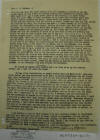
|
August 17, 1927. Letter from Henry
Spears, Puerto Cabezas, to Gen. Juan J. Estrada,
Bluefields, p. 2.
"[...] Gen. J[.] J. Estrada, -2 ¶ […] from the
schooner. The wharf leading from the sidewalk is
fenced in and has a gate which is kept locked to
prevent persons from entering my private home.
This night there was a negro dance given at the
cantina of a negro Nathan Cole, his place is in
close proximity to my house. The Governor along
with several others attended the dance, became
drunk and abusive, after the crew on the
schooner Winfield left and entered my wharf,
locked the gate and went aboard the schooner to
sleep, the Governor was making a great scandal
in the street, cursing, and flourishing his
pistol, telling everybody that they had better
go to sleep, one of the crew on board said
something to someone about the scandal, without
knowing who was actually doing it, the result
was that the Governor called out from the
sidewalk in front of my gate that he was the
Governor and he did not want to hear another
word out of any D----- S-- of a B----, he then
without further words, fired his pistol at the
boat, the bullet passing through the gate post,
where the hole still remains,- after which he
broke through my gate by force, tearing down the
boards, went on board of the schooner, found one
of the crew in the cabin, and began beating him
over the head with his pistol, (blood still
being on the floor of the cabin, and in the
doorway,[)?] then forced the negro to go ashore,
a regular stream of blood dropping along my
private wharf, took him to jail, locked him up,
left him there with the result that in the
morning the negro had lost so much blood, he
could hardly walk. He finally called the negro
from the jail to see how badly he was hurt, and
told him to go, without placing any fine on him,
which shows clearly that the negro had not
committed any crime to justify such treatment.
His head above his left eye was broken, for
about 2 inches, (the skin, of course) his left
cheek bursted, his fingers on one hand brusted
[busted?], evidently by trying to protect his
head from the assault of the Governor, his arms
bruised considerably. ¶ He signed my papers that
morning and sent them to me by the Customs
Broker, and I have not seen him since. ¶ He has
given instructions to permit lumber shipped out
by Mr/ [Mr.] Asmussen, which lumber has been
secuestred by me and I am still depositario for
the lumber and this a criminal act on the part
of the authority. The fact, as it stands today
is as follows: After finding my lumber, with my
registered brand on the ends of the pieces in
the possession of Asmussen and Bordas, (in their
lumber yard) Mr. Bordas admitted it was mine;
that he had bought it from some indians. His
confession is a part of the documents now in the
hands of the Local Judge at the Cape. The
District Judge, Sr. Diaz, had been at the Cape
several days when I left there for this place on
a business matter, and up to that time the Local
Judge, who I understand is the father of the
Governor, had not delivered to him the documents
or papers in the matter of this secuestration,
and after I left I received a cable from Mrs.
Spears, which reads as follows: “Asmussen
shipping your lumber”, showing that they were
just waiting until my departture [departure] to
committ [commit] this robbery. I have never been
advised that the secuestration has been raised,
and know of no such act, and can only come to
the conclusion that the Governor is permitting
Asmussen to ship out my lumber illegally, and
which in effect, is nothing more than robbery. ¶
I am sending a copy of this complaint to the
American Consul in Bluefields, and feel sure
that you will give me some relief or guarantee
for not only my property, but for the life of
myself and family. At this moment, I have none,
all of which is shown by the above statement,
which I can verify at any time you feel disposed
to send a representative to investigate. ¶
Assuring you that I deeply regret to find it
compulsory to make this complaint, I am ¶ Very
truly yours, ¶ Henry Spears ¶ [unreadable]
American Consul, Bluefields"
|
|
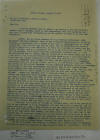
|
August 17, 1927. Henry Spears,
Puerto Cabezas, to US Consul A. J. McConnico,
Bluefields, p. 1.
"Puerto
Cabezas, August 17, 1927 ¶ Mr. A. J. McConnico,
American Consul, ¶ Bluefields, Nic. ¶ Dear Sir:
¶ I enclose herewith copy of letter I am sending
to the Jefe Politico, General Juan J. Estrada,
which is self explanatory, with the exception
that I give you a little more information as to
the parties referred to in that communication. ¶
Bordas, was appointed Governor of Cape Gracias
in November, 1925, by General Emiliano Chamorro,
after he had overthrown the government. He
having a sawmill in partership [partnership]
with a German by the name of John Asmussen, he
forced indians who I had cutting logs from my
lands, and for which they had received advances
amounting to over $3000.000, to bring the logs
down to himself and Asmussen, thereby, making it
impossible for me to get hold of my property or
collect my accounts, until after peace was
established, at which time, I, with the
authorities and Mr. Bordas, made an inspection
of his lumber yard, and there found quite a lot
of lumber with my registered brand on it, I also
have declarations from the indians themselves
stating that they sold my logs to Asmussen,
[unreadable] once, embargoed (secuestrado) the
logs, and was appointed as the receiver
(depositario) for the logs and lumber, amounting
to some 400,000 feet, and after the arrival of
the present Governor, he has permitted Asmussen,
without my knowledge or consent, to ship out
considerably over 30,000 feet of this lumber,
thereby doing nothing less than stealing my
property the second time. I am, legally, held
responsible for the entire amount on the yard
and also that which has been shipped. Bordas and
Asmussen, both of whom are mixed up in family
with indians and understand their language, also
having a number of mixed breeds who are ready to
serve them, have made it their business to
intercept the indians who are now trying to
deliver logs to me to pay my accounts, and are
advising them that all they have to do is to
deny their accounts to the Governor and he will
force me to turn the logs loose, which he has
already done. The indians being unable to write,
it is the custom throughout the entire country
to give them credit or advances for work they
agree to perform without any documents of any
nature. I have worked mahogany camps and managed
mahogany companies for the past 14 years,
investing many millions throghout [throughout]
Mexico and all Central America and know their
customs well, all of which can be verified by
any mahogany man in this country. The Governor
to have a subtefuge [subterfuge] behind which to
hide, asked me for documens [documents] or other
documentary evidence to prove my account, and
not being able to give this, forced me to
deliver the logs back to the indians. ¶ I have
had this matter up through Lt. Connette here,
and he has assured me that he had referred it to
the Commander, but this being over a week ago,
and not having received any news, I have decided
to put the matter before the authorities and
your good offices, hoping for some relief. This
is positive, I expect to return to the Cape
about next Tuesday, the 23rd instant, and feel
sure that if the Governor has not received
instructions in this matter that he is going to
try to commit further abuses and insults and
robberies, and will be met with the proper
material to defend my family, myself and my
property. It is impossible that I stand by and
look on suchmalicious [such malicious], criminal
and cruel abuses and insults. ¶ In the first
place, the Governor is nothing but a very low
type of drunkard, this can be proven by
inquiring of any reliable person in Bluefields,
I will not […]"
|
|
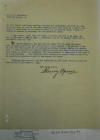
|
August 17, 1927. Henry Spears,
Puerto Cabezas, to US Consul A. J. McConnico,
Bluefields, p. 2.
"[...] Mr. A.
J. McConnico, ¶ American Consul, -2 ¶ […] go
into detail over these matters, but you can
investigate and find out that it is not wise to
live in the same community with this class of a
person. Instead of protecting, he is trying to
kill. If he remains there, I will be forced to
abandon my business, for the moment at least. ¶
I may mention here, that the lands I control are
not in my name, but are in the name of people
whom I represent, and are in perfect order and
in accordance with the law. ¶ Dr/ [Dr.] Onofre
Sandoval, who has been my lawyer for the past
ten years will be glad to give you any
information on this subject. I am writing to him
to look into this matter to try and save me
further losses. During the revolution, I have
receipts for several hundred dollars that they
took from my store, both sides, no doubt, by
necessity, but nevertheless, it represents a big
loss to me in my business. I am preparing these
receipts to present them to see if it is
possible to receover [recover] a part of the
amount, at least. ¶ Trusting that you will use
the influence of your good offices to give me
some relief in this matter, I am, ¶ Very truly
yours, ¶ Henry Spears"
|
|
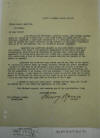
|
August 17, 1927. Henry Spears,
Puerto Cabezas, to Dr. Onofre Sandoval,
Bluefields.
"Puerto Cabezas,
August 17, 1927 ¶ Doctor Onofre Sandoval, ¶
Blufields [Bluefields]. ¶ My dear Doctor: ¶ I am
writing Mr/ [Mr.] McConnico, American Consul,
also General Estrada about the abuses and
insults that I have been forced to accept from
the new Governor, Salaverri. I have also
mentioned to Mr. McConnico that you would be
glad to explain the entire situation to him
relative to the lands I represent, also as to
the confessions, etc. in my matter against
Asmussen. ¶ Salaverri has permitted Asmussen to
ship out several cargoes of pine lumber, even
after I was appointed depositario of the lumber
and logs secuestrados, even without my knowledge
or consent, and I certainly would appreciate it
if you would see both the Consul and General
Estrada about this matter with a view of having
some changes made for the benefit of the public
in general. ¶ Salaverri has committed many
crimes against me, even to the extent of
entering my private home, by force, breaking
through the gates, shooting at some of the crew
of my schooners, being drunk and raising a
scandal in general. Is openly against me and my
interests, illegally and criminally, and for the
protection of my family, self and property, I
feel sure that something should be done. I have
asked the American Consul to consult with the
reliable people of Bluefields in order to get
the facts as to the personal character of this
young man they have appointed as Governor of the
Cape. ¶ I expect to sail from here about Tuesday
for the Cape, and if you can assist me, I will
certainly appreciate it very much. ¶ With
kindest regards, and assuring you of my
appreciation, I am, ¶ Sincerely yours, ¶ Henry
Spears ¶ [unreadable, possibly “c/c”] American
Consul, ¶ Bluefields."
|
|
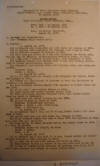
|
August 21, 1927. Weekly Report,
3rd Battalion, 5th Regt., Matagalpa, p. 1.
"40-L-FSNE-wib ¶
HEADQUARTERS THIRD BATTALION FIFTH REGIMENT, ¶
SECOND BRIGADE, U.S. MARINE CORPS, MATAGALPA,
NICARAGUA, ¶ 21 August, 1927. ¶ WEEKLY REPORT ¶
THIRD BATTALION, FIFTH REGIMENT, USMC., ¶ From:
0001 – 14 August, 1927 ¶ To: 2400 – 20 August,
1927. ¶ C.P., MATAGALPA, NICARAGUA, ¶ August 21,
1927. ¶ 1. Strength and Distribution. ¶ (See
attached daily report Bn-1). ¶ 2. Events:- ¶ A.
August 14, 1927. ¶ (a) Lt Gladden and 4 enlisted
men left Dario for Managua at 0800. ¶ (b) Lt
Coffman left Matagalpa for Jinotega with 2 men
at 0820. ¶ (c) Lt Stafford arrived at Managua at
0900. ¶ (d) Capt Luby and patrol of 9 men left
Matagalpa for Tierra Azul, via Muy Muy and
Portilio, to investigate Sebastian Perez, at
0930. ¶ (e) 3 men with 6 animals arrived Dario
from Matagalpa at 2400. ¶ (f) Received report
that Salzado with 60 men were raiding Somoto.
Jefe at Esteli investigating report. ¶ (g)
Telegraph line between Dario and Tipitapa down.
Line being repaired. ¶ Weather: Rain. ¶ Roads:
Clear. ¶ B. August 15, 1927. ¶ (a) Lt Orr with 2
men and animals left Matagalpa for Sebaco, Dario
and Managua at 0745. ¶ (b) Orders for Capt
Kieren at Jinotega to have his detachment in
readiness for movement. ¶ (c) Capt Hatfield
leaving Ocotal 17th expects to arrive Pueblo
Nuevo 18th. ¶ (d) Lt Orr and 2 men arrived
Sebaco at 1500. ¶ (e) Major Floyd and column
arrived Ocotal 1330. ¶ (f) Bull cart train
cleared Trinidad 0800. Will arrive Esteli
tomorrow night or Wednesday. ¶ (g) Capt Luby and
patrol arrived Muy Muy 1730. ¶ (h) Lt Orr
arrived at Dario at 2000. ¶ Weather:
Intermittent showers. ¶ Roads: Muddy – slow
travelling. ¶ Sick: Matagalpa 4. ¶ C. August 16,
1927. ¶ (a) Lt Coffman with 1 man, and 37 MM
gun, Trench mortor [mortar] left Jinotega at
0830. ¶ (b) Lt Orr with two men left Dario for
Managua at 0840. ¶ (c) Plane circled around and
made 3 drops 0930 and departed at 0945. U.S.
Mail and Q.M. supplies. ¶ (d) Pack train, 32
mules cleared Esteli dor [for] Pueblo Nuevo at
1420. 2 – M.G. 17 guards. ¶ Weather: clear and
bright; no rain. ¶ Roads: muddy. ¶ Sick: 4. ¶ D.
August 17, 1927 ¶ (a) Lt Coffman and 1 man with
37 MM gun, Trench mortor [mortar] and ammunition
arrived Matagalpa from Jinotega at 0620. ¶ (b)
Lt Esau and 10 men left Sebaco for Dario at
0900. ¶ (c) Rep. Marines firing in street at Muy
Muy from Jefe at Muy Muy ¶ (d) 14 men of convoy
guard returned to Jinotega from Yali, Lt B[the
rest of name cut off] and 3 men remained San
Rafael to assist Tuttle 1345."
|
|
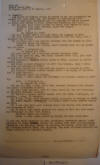
|
August 21, 1927. Weekly Report,
3rd Battalion, 5th Regt., Matagalpa, p. 2.
"[...] PAGE #2.
¶ WEEKLY REPORT BN-1 ¶ 14 August, 1927 to 20
August, 1927. ¶ 2. Events:- ¶ (e) Report of
marines firing in street at Muy Muy groundless
received from Capt Luby, who was ordered to
investigate 1430. ¶ (f) Lt Esau with detachment
and all property at Sebaco arrived at Dario from
Sebaco at 1440. Sebaco was abandoned this date.
¶ (g) All bull cart train arrived at Esteli from
Sebaco at 1500. ¶ Weather: Very light showers,
clear and bright. ¶ Roads: Very muddy. ¶ Sick:
4. ¶ E. August 18, 1927. ¶ (a) Capt Martin with
1 man left Dario from Managua at 0400. ¶ (b)
Capt Hatfield arrived Pueblo Nuevo at 1730 the
17th, with 2 officers and 40 men. ¶ (c) Lt Brown
and 3 men arrived Jinotega from San Rafael at
1315. ¶ Weather: Clear and bright. ¶ Roads:
Muddy, but drying, don’t believe they are yet
passable for auto. ¶ Sick: Matagalpa 4. ¶ F.
August 19, 1927. ¶ (a) Capt Martin and 1
enlisted arrived Tipitapa 0230. ¶ (b) 2 men from
Hd. Cp., 5th Regt. arrived Dario 2100, 18th with
supplies for Matagalpa. ¶ (c) Bleasdale, cleared
Pueblo Nuevo at 0715, expected to arrive Esteli
20th. ¶ (d) Plane arrived Matagalpa at 1000 from
Managua. Made 2 drops of mail and cleared at
1005. ¶ (e) Capt Martin and 1 enlisted man
arrived at Managua at 1200. ¶ (f) Tuttle’s
column arrived Esteli 1300. 3 officers, 45
enlisted and 25 pack animals. ¶ Weather: Clear
and bright. ¶ Roads: Still heavy and difficult
of passage. Drying up slowly. ¶ Sick: Matagalpa
4. ¶ G. August 20, 1927. ¶ (a) Our 1st Sgt, 1
Cpl. and 1 Pvt. cleared Matagalpa for Managua
for dental treatment at 0700. ¶ (b) Capt Luby
reported that he would leave Muy Muy for
Matagalpa at daylight Saturday morning. ¶ (c)
Tuttle’s column arrived Esteli 1300 the 19th. 3
officers, 45 marines, 1 navy, 25 animals. ¶ (d)
2 men, 1 bull cart cleared Dario, returning to
Managua at 0900. ¶ (e) Nueva Segovia Detachment
and Pueblo Nuevo Train arrived Esteli at 1200. ¶
(f) 2 men with bull cart cleared Dario for
Esteli with gasoline and kerosene at 1400. ¶ (g)
Lt Gould with truck cleared for Dario at 0800
and left Dario for Matagalpa at 1500 with
stores. ¶ Weather: Clear and bright. ¶ Roads:
Very rough caused by drying and bull cart ruts.
¶ 3. Law and order prevails in this territory.
Merchants report large increase in their trades.
People are coming into town for purchases.
Merchants are shipping stores to outlying
districts. There has been no friction between
Civil and Military. The best attitude prevails
between civilian and military forces. ¶ F.S.N.
ERSKINE."
|
|
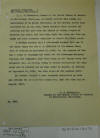
|
August 22, 1927.
Affadavit re S.S. Munardan of the
Munson Line, by US Consul A. J. McConnico,
Bluefields.
"American Consulate, ¶ Bluefields, Nicaragua. ¶
I, A. J. McConnico, Consul of the United States
of America at Bluefields, Nicaragua, do hereby
certify that during the bombardment of El Bluff,
Nicaragua, by the Liberal forces from September
10, to 20, 1926, three merchant ships arrived
and anchored off the port with the object of
taking cargoes of mahogany and cedar, but that
they could not enter nor take any cargo and were
therefore compelled to depart for other ports. ¶
I further certify that I afterwards learned that
one of the three ships was the S. S. MUNARDAN of
the Munson Line; that it arrived on September
11, 1926, for the purpose of taking a cargo of
mahogany and cedar for the Nicaragua Mahogany
Company, the company’s logs then being in the
lagoon ready for shipment; but, as stated, owing
to actual hostilities the ship could not be
entered and no logs could be loaded, so finally
on September 16, 1926, the ships departed for
another port. ¶ IN WITNESS WHEREOF I have
hereunto subscribed my name and affixed the seal
of this consulate, this the 22nd day of August,
1927. ¶ A. J. McConnico, ¶ Consul of the United
States of America ¶ at Bluefields, Nicaragua. ¶
No. 406."
|
|
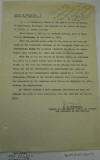
|
August 22, 1927. Affadavit re
estate of US citizen Vernon L. Childs, by US
Consul A. J. McConnico, Bluefields.
"American Consulate,
¶ Bluefields, Nicaragua. ¶ I, A. J. McConnico,
Consul of the United States of America at
Bluefields, Nicaragua, and Executor of the
Estate of VERNON L. CHILDS, do hereby certify: ¶
That Vernon L. Childs, an American citizen, died
in Bluefields, Nicaragua, on September 6, 1927;
¶ That for several years prior to his death he
had been engaged in the mercantile business on
the Escondido River and its tributaries, using
the gasoline houseboat LA OLA as his storehouse,
thus carrying his goods and wares to his
customers; ¶ That the LA OLA was seized by
Liberal forces on September 11, 1926, at a point
called Loma de Mico on the Escondido River, as
the boat was returning to Bluefields from its
usual trip, and all the merchandise was
confiscated and used, as evidenced by the
accompanying voucher signed by E. DUARTE, the
Commanding Officer of the Liberal forces; that
said houseboat was recovered by the American
naval forces on September 14, 1926, without the
merchandise. ¶ IN WITNESS WHEREOF I have
hereunto subscribed my name and affixed the seal
of this consulate, this the 23rd day of August,
1927. ¶ A. J. McConnico, ¶ Consul of the United
States of America ¶ and Executor of the Estate."
|
|
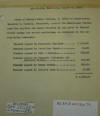
|
August 22, 1927. Claim of Bonanza
Mines Company against Nicaraguan Government for
supplies & money demanded by & given to Liberal
forces during the civil war.
"Bluefields,
Nicaragua, August 23, 1927. ¶ Claim of Bonanza
Mines Company, an American corporation, Benjamin
C. Warnick, President, against the Nicaraguan
Government for supplies and money demanded by
and given to Liberal forces during the recent
revolution, as evidenced by the accompanying
vouchers:- ¶ Voucher signed by Francisco
Gonzales……. $154.88 ¶ Voucher signed by
Sebastian Perez……….. [$]54.50 ¶ Voucher signed
by Luis Arroliga…………. [$]500.00 ¶ Voucher signed
by Fernando Gutierrez and Humberto
Milina……………….. [$]266.60 ¶ Voucher signed by
Ramon Gradis…………… [$]500.00 ¶ Voucher signed by
Rodolfo Dorn B………… [$]48.60 ¶ $1,524.58"
|
|
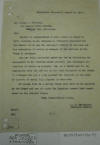
|
August 25, 1927. Letter from US
Consul A. J. McConnico, Bluefields, to Mr.
George A. Napoleon, Neptune Mine.
"Bluefields, Nicaragua, August 25, 1927. ¶ Mr.
George A. Napoleon, ¶ C/o Bonanza Mines Company,
¶ Neptune Mine, Nicaragua. ¶ Sir: ¶ Receipt is
acknowledged of your letter of August 8, 1927,
relating to Mr. Benjamin C. Warnick’s departure
for the United States and Mr. Skaling’s arrival
at the mine and his assumption of duties as
manager at the instance of Mr. Henry F.
Springer. ¶ You are fully protected under the
law by delivering the management to Mr. Skaling
under protest. Mr. Skaling’s assumption of
duties as manager, is, as I understand it, in
conformity with the law for he has been
delegated by Mr. Henry F. Springer who has a
lien against the products of the mine to operate
it until full payment is received. ¶ Of course
this is a matter which will have to be adjusted
by the Court and one of which the Legation
cannot take cognizance in its present stage. ¶
Very respectfully yours, ¶ A. J. McConnico, ¶
American Consul. ¶ McC/S. ¶ 350."
|
|
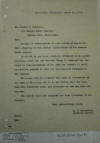
|
August 31, 1927. Letter from US
Consul A. J. McConnico, Bluefields, to Mr.
George A. Napoleon, Neptune Mine.
"Bluefields, Nicaragua, August 31, 1927. ¶ Mr.
George A. Napoleon, ¶ c/o Bonanza Mines Company,
¶ Neptune Mine, Nicaragua. ¶ Sir: ¶ Receipt is
acknowledged of your letter of August 14, 1927,
relating to the present difficulties of the
Bonanza Mines Company. ¶ As stated to you in my
previous letter, it is my understanding, under
the law that Mr. Henry F. Springer has the right
to take possession of the mine and operate it
until he receives payment in full for the
supplies furnished to the Company. ¶ Of course
this is a matter that must be determined by the
Laws of Nicaragua and it is not likely that the
Legation will intervene until all resources at
law has been exhausted. ¶ The letter which you
enclosed has been forwarded to Mr. Warnick. ¶
Very respectfully yours, ¶ A. J. McConnico, ¶
American Consul. ¶ McC/S. ¶ 350."
|
|
NEXT PAGE
|
|
|
|
